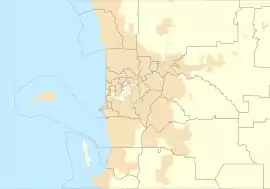| 2014 Perth Hills bushfire (Parkerville fire) | |
|---|---|
| Coordinates | 31°52′46″S 116°9′00″E / 31.87944°S 116.15000°E (approximate ignition point on corner of Granite Rd. and Johnson Road, Parkerville) |
| Statistics[1]: 7–8 [2][3][4] | |
| Cost | At least A$13 million |
| Date(s) | 12 January – 1 February |
| Burned area | At least 386 hectares (1,000 acres) |
| Cause | Accidental (power pole falls, igniting vegetation) |
| Land use |
|
| Buildings destroyed |
|
| Map | |
 Location of the approximate ignition point, relative to the Perth central business district in Western Australia | |
The 2014 Perth Hills bushfire, sometimes referred to as the Parkerville fire, was a bushfire that burned from 12 January to 1 February and affected the Mundaring municipality of the Perth Hills in the Australian state of Western Australia. During a major run of the fire on the afternoon and evening of 12 January, fifty-seven houses and numerous non-residential buildings were completely destroyed, and a further six houses were damaged in the suburbs of Mount Helena, Stoneville, and Parkerville.[1]: 7–8 Approximately 386 hectares (1,000 acres) of uncleared land and pasture—the majority on private property—were burned during the 21-day duration of the fire.[3][5]: 3–4 None of the residential subdivisions impacted had been formally declared as being within a bushfire prone area.[5]: 3–4
The cause of the fire was recorded as accidental by the Department of Fire and Emergency Services (DFES). The source of ignition was determined by both the DFES and Energy Safety to have been a fallen power pole, which ignited extremely dry vegetation at approximately 11:00 AWST (UTC+8) during a period of easterly winds gusting up to moderate gale force and temperatures in excess of 40 °C (104 °F).[2][6] A considerable quantity of property in Stoneville was destroyed following a wind change that brought fresh breezes from the south west to the fire ground, just prior to 15:00 AWST.[1]: 7–8
Background
In the Mt. Helena, Parkerville, and Stoneville suburbs of Mundaring Shire there are a mixture of large properties with stands of open woodland and pastures, and standard residential blocks with trees in a close vicinity to houses.[1]: 7–8 The majority of the area eventually burned was within a broad valley sloping gently upward, west to east.[1]: 7–8 The fuels were typical of a Eucalypt open forest; an over-story composed primarily of jarrah (eucalyptus marginata) and marri (corymbia calophylla), with scrub, leaf litter and patches of grass constituting the fuel load in the under-story.[1]: 7–8 [5]: 3–4 The estimated average fuel load was 15 tonne per hectare (t/ha), with a maximum fuel load of 20 t/ha in some areas of the fire ground.[5]: 3–4
Fire timeline
Aftermath
See also
References
- 1 2 3 4 5 6 McLennan, Jim (2014). Capturing community members' bushfire experiences: interviews with residents following the 12 January 2014 Parkerville (WA) fire (PDF). Australia: Bushfire & Natural Hazards CRC. ISBN 9780994169600.
- 1 2 Smith, Kristine, ed. (2014). "Beyond the blaze" (PDF). 24seven. Department of Fire and Emergency Services (1): 16–19.
- 1 2 State Emergency Management Committee (2014). Parkerville, Stoneville, Mt. Helena Bushfire Review (PDF). Perth, Western Australia: Government of Western Australia. p. 79. Archived from the original (PDF) on 10 March 2016.
- ↑ De Poloni, Gian (13 August 2015). "Parkerville fire: Residents launch legal action against Western Power". ABC News. Australia. Retrieved 7 May 2016.
- 1 2 3 4 Smith, Ralph; Parker, Jackson; Choney, Gary; Moss, Jeff; Lia, Jodie (2015). Report on Bushfire Behaviour and House Damage and Destruction during the Parkerville, Mt Helena and Stoneville Bushfire on 12th January 2014 (PDF). Cockburn Central, Western Australia: Government of Western Australia.
{{cite book}}:|work=ignored (help) - ↑ "Perth Airport, Western Australia; January 2014 - Daily Weather Observations". Bureau of Meteorology. Commonwealth of Australia. Archived from the original on 13 February 2014. Retrieved 7 May 2016.